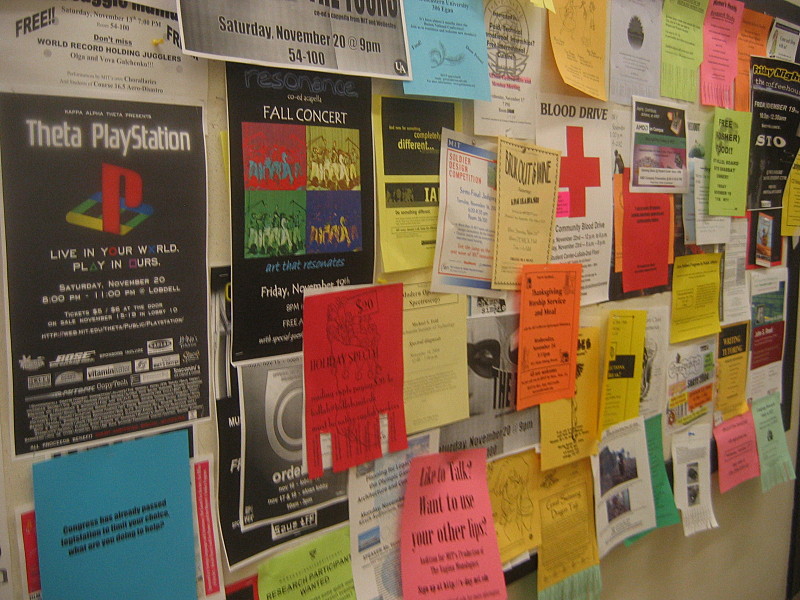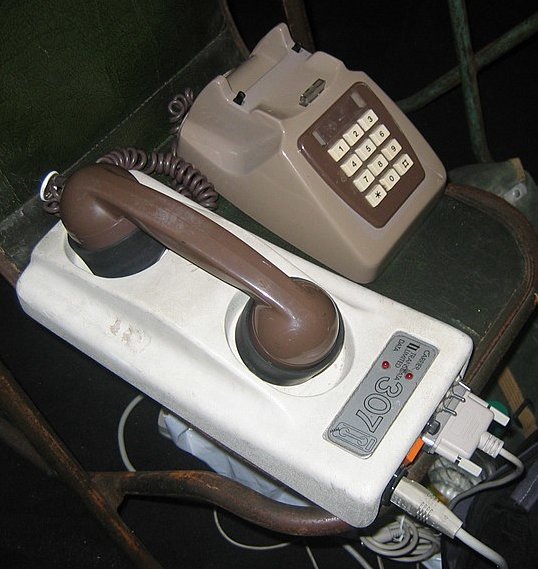|
Community Memory
Community Memory (CM) was the first public computerized bulletin board system. Established in 1973 in Berkeley, California, it used an SDS 940 timesharing system in San Francisco connected via a 110 baud link to a teleprinter at a record store in Berkeley to let users enter and retrieve messages. Individuals could place messages in the computer and then look through the memory for a specific notice. While initially conceived as an information and resource sharing network linking a variety of counter-cultural economic, educational, and social organizations with each other and the public, Community Memory was soon generalized to be an information flea market, by providing unmediated, two-way access to message databases through public computer terminals.Schuler, D. (1994). Community networks: Building a new participatory medium. Communications of the ACM, 37(1), 38 Once the system became available, the users demonstrated that it was a general communications medium that could be used ... [...More Info...] [...Related Items...] OR: [Wikipedia] [Google] [Baidu] |
Community Memory Terminal At Leopold's Records
A community is a social unit (a group of living things) with commonality such as place, norms, religion, values, customs, or identity. Communities may share a sense of place situated in a given geographical area (e.g. a country, village, town, or neighbourhood) or in virtual space through communication platforms. Durable good relations that extend beyond immediate genealogical ties also define a sense of community, important to their identity, practice, and roles in social institutions such as family, home, work, government, society, or humanity at large. Although communities are usually small relative to personal social ties, "community" may also refer to large group affiliations such as national communities, international communities, and virtual communities. The English-language word "community" derives from the Old French ''comuneté'' ( Modern French: ''communauté''), which comes from the Latin '' communitas'' "community", "public spirit" (from Latin ''communis'', "co ... [...More Info...] [...Related Items...] OR: [Wikipedia] [Google] [Baidu] |
Heroes Of The Computer Revolution
Heroes or Héroes may refer to: * Hero, one who displays courage and self-sacrifice for the greater good Film * ''Heroes'' (1977 film), an American drama * ''Heroes'' (2008 film), an Indian Hindi film Gaming * ''Heroes of Might and Magic'' or ''Heroes'', a series of video games *''Heroes of the Storm'' or ''Heroes,'' a 2015 video game * ''Heroes'' (role-playing game) (1979) * '' Heros: The Sanguine Seven'', a 1993 video game * ''Sonic Heroes'', a 2003 video game in the ''Sonic the Hedgehog'' franchise Literature * ''Heroes'' (book series), short novels and plays intended for young boys * ''Heroes'' (comics), a 1996 comic book by DC Comics * ''Heroes'' (novel), a 1998 novel by Robert Cormier * ''Heroes'' (play), a translation by Tom Stoppard of ''Le Vent Des Peupliers'' by Gérald Sibleyras * '' Heroes: Saving Charlie'', a 2007 novel based on the American TV series ''Heroes'' * ''Heroes'', a role-playing game magazine by Avalon Hill * ''Heroes'', a 2018 collection of ... [...More Info...] [...Related Items...] OR: [Wikipedia] [Google] [Baidu] |
Whole Earth Access
Whole Earth Access (19691998) started as a countercultural retail store in Berkeley, California. In the early 1990s, Whole Earth Access had seven stores in Northern California. After filing for bankruptcy in 1996, all stores closed in 1998. History The ''Whole Earth Catalog'' was preceded by the "Whole Earth Truck Store", a 1963 Dodge truck. In 1968, the "Truck Store" finally settled into its permanent location in Menlo Park, California. In 1969, a store that was inspired by (but not financially connected with) the ''Whole Earth Catalog'', called Whole Earth Access opened in Berkeley. The store had the Leopold's Records Teletype Model 33 ASR which connected to the Community Memory Project SDS 940 mainframe computer.Community Memory Project, 1972-74 at |
Fusion (music)
A music genre is a conventional category that identifies some pieces of music as belonging to a shared tradition or set of conventions. It is to be distinguished from ''musical form'' and musical style, although in practice these terms are sometimes used interchangeably. Music can be divided into genres in varying ways, such as popular music and art music, or religious music and secular music. The artistic nature of music means that these classifications are often subjective and controversial, and some genres may overlap. Definitions In 1965, Douglass M. Green distinguishes between genre and form in his book ''Form in Tonal Music''. He lists madrigal, motet, canzona, ricercar, and dance as examples of genres from the Renaissance period. To further clarify the meaning of ''genre'', Green writes "Beethoven's Op. 61" and "Mendelssohn's Op. 64 ". He explains that both are identical in genre and are violin concertos that have different form. However, Mozart's Rondo for Piano, K. 51 ... [...More Info...] [...Related Items...] OR: [Wikipedia] [Google] [Baidu] |
Keyword (internet Search)
Search engine optimization (SEO) is the process of improving the quality and quantity of website traffic to a website or a web page from search engines. SEO targets unpaid traffic (known as "natural" or "organic" results) rather than direct traffic or paid traffic. Unpaid traffic may originate from different kinds of searches, including image search, video search, academic search, news search, and industry-specific vertical search engines. As an Internet marketing strategy, SEO considers how search engines work, the computer-programmed algorithms that dictate search engine behavior, what people search for, the actual search terms or keywords typed into search engines, and which search engines are preferred by their targeted audience. SEO is performed because a website will receive more visitors from a search engine when websites rank higher on the search engine results page (SERP). These visitors can then potentially be converted into customers. History Webmasters an ... [...More Info...] [...Related Items...] OR: [Wikipedia] [Google] [Baidu] |
The WELL
The Whole Earth 'Lectronic Link, normally shortened to The WELL, was launched in 1985. It is one of the oldest continuously operating virtual communities. By 1993 it had 7,000 members, a staff of 12, and gross annual income of $2 million. A 1997 feature in ''Wired'' magazine called it "The world's most influential online community." In 2012, when it was last publicly offered for sale, it had 2,693 members. It is best known for its Internet forums, but also provides email, shell accounts, and web pages. Discussion topics are organized into conferences that cover broad areas of interest. User anonymity is prohibited. History The WELL was started by Stewart Brand and Larry Brilliant in 1985. The name follows the naming of some of Brand's earlier projects, including the '' Whole Earth Catalog''. Initially The WELL was owned 50% by The Point Foundation, publishers of the Whole Earth Catalog and Whole Earth Review, and 50% by NETI Technologies Inc. a Vancouver-based company of w ... [...More Info...] [...Related Items...] OR: [Wikipedia] [Google] [Baidu] |
Bulletin Board
A bulletin board (pinboard, pin board, noticeboard, or notice board in British English) is a surface intended for the posting of public messages, for example, to advertise items wanted or for sale, announce events, or provide information. Bulletin boards are often made of a material such as cork to facilitate addition and removal of messages, as well as a writing surface such as blackboard or whiteboard. A bulletin board which combines a pinboard (corkboard) and writing surface is known as a combination bulletin board. Bulletin boards can also be entirely in the digital domain and placed on computer networks so people can leave and erase messages for other people to read and see, as in a bulletin board system. Bulletin boards are particularly prevalent at universities. They are used by many sports groups and extracurricular groups and anything from local shops to official notices. Dormitory corridors, well-trafficked hallways, lobbies, and freestanding kiosks often have c ... [...More Info...] [...Related Items...] OR: [Wikipedia] [Google] [Baidu] |
Modem
A modulator-demodulator or modem is a computer hardware device that converts data from a digital format into a format suitable for an analog transmission medium such as telephone or radio. A modem transmits data by Modulation#Digital modulation methods, modulating one or more carrier wave signals to encode digital information, while the receiver Demodulation, demodulates the signal to recreate the original digital information. The goal is to produce a Signal (electronics), signal that can be transmitted easily and decoded reliably. Modems can be used with almost any means of transmitting analog signals, from light-emitting diodes to radio. Early modems were devices that used audible sounds suitable for transmission over traditional telephone systems and leased lines. These generally operated at 110 or 300 bits per second (bit/s), and the connection between devices was normally manual, using an attached telephone handset. By the 1970s, higher speeds of 1,200 and 2,400 ... [...More Info...] [...Related Items...] OR: [Wikipedia] [Google] [Baidu] |
Teletype Model 33
The Teletype Model 33 is an electromechanical teleprinter designed for light-duty office use. It is less rugged and cost less than earlier Teletype machines. The Teletype Corporation introduced the Model 33 as a commercial product in 1963 after being originally designed for the United States Navy. There are three versions of the Model 33: * Model 33 ASR, (Automatic Send and Receive), which has a built-in eight-hole punched tape reader and tape punch; * Model 33 KSR (Keyboard Send and Receive), which lacks the paper tape reader and punch; * Model 33 RO (Receive Only) which has neither a keyboard nor a reader/punch. The Model 33 was one of the first products to employ the newly-standardized ASCII code, which was first published in 1963. A companion Model 32 used the older, more-established five-bit Baudot code. Because of its low price and ASCII-compatibility, the Model 33 was widely used with early minicomputers, and the large numbers of the teleprinter which were sold strongly ... [...More Info...] [...Related Items...] OR: [Wikipedia] [Google] [Baidu] |
Berkeley Was Building Online Communities In 1973 In Local Record Shops
Berkeley most often refers to: *Berkeley, California, a city in the United States **University of California, Berkeley, a public university in Berkeley, California * George Berkeley (1685–1753), Anglo-Irish philosopher Berkeley may also refer to: Places Australia * Berkeley, New South Wales, a suburb of Wollongong Canada * Berkeley, Ontario, a community in Grey County United Kingdom * Berkeley (hundred), an administrative division from late Saxon period to the 19th century * Berkeley, Gloucestershire, a town in England United States * Berkeley, California, a city in the San Francisco Bay Area, the largest city named Berkeley * Berkeley, Denver, a neighborhood in Denver, Colorado * Berkeley, Illinois, a suburb of Chicago * Berkeley, Missouri, a northwestern suburb of St. Louis * Berkeley Township, Ocean County, New Jersey * Berkeley, Rhode Island * Berkeley, Virginia (other) * Berkeley, West Virginia * Berkeley County (other) People * Berkeley (given n ... [...More Info...] [...Related Items...] OR: [Wikipedia] [Google] [Baidu] |


.jpg)
.jpg)



